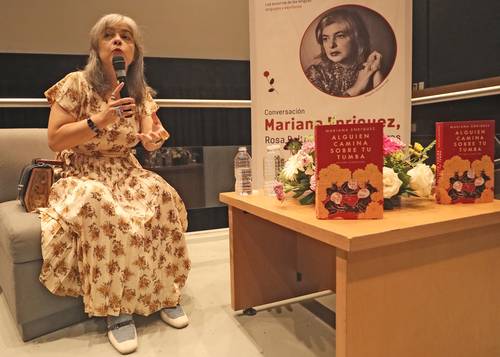Modern horror literature is based on shared fears, says Mariana Enríquez
Modern horror literature is based on collective fear, which begins to be understood this way from Carrie, by Stephen King, a novel that turns half a century this year, said the Argentine writer Mariana Enríquez.
The author indicated that all The contemporary writers that I know and read are to a greater or lesser extent on the community line
; He clarified that although his work does not completely fit into this tenor, “I really like the body horror; So, I work a lot with the body. That can be a shared fear.”
Enríquez spoke with the media this Sunday, the last day of the Book and Rose Festival 2024, which until yesterday afternoon had an attendance of 53 thousand people. Hundreds of admirers attended a conference given by the journalist at the fair organized by the National Autonomous University of Mexico.
This Monday, the novelist will talk with students on the South campus of the College of Sciences and Humanities, at 11 a.m.
Mariana Enríquez mentioned that current horror literature can “take urban legends, which are oral stories that circulate, mythologies and popular stories that also have no author and are community-based. That is also our material in the absence of a clearer literary tradition, because it is one thing to have examples, another thing is a tradition.
She added that she even employs “creepypastas (short horror stories shared over the Internet) that scare me, or podcast. I really like programs where the listener calls and tells, because horror, like humor, is one of the few genres that doesn’t need as much. It is enough for one to be more or less calm at home and turn on a podcast or the radio and there is a person telling a story and that is scarier.”
Although the horror narrative It is very archaic, very anachronistic, it is one of the stories that today, with the fragmentation of stories, still holds up as such and keeps your attention. One can spend 15 or 20 minutes listening to that. They are things that circulate and end up being communal. Terror is something very shared
.
Closer to Stephen King than Bolaño
The novelist said that she likes to work a horror with a very realistic basis of fear, which can then be represented with supernatural events, which can also be violent. I am particularly interested in the conflict that we have not only in Latin America, but everywhere: the necessary indifference and even daily cruelty or lack of solidarity, and in some cases I have identified paranoia
.
Enriquez said that Since horror is a genre that speaks of otherness, of the monster, of who we consider a monster, in our societies we very much constitute that being as people who are in a situation of vulnerability.
.
He argued that in all societies, developed or not, especially since the pandemic, it was consolidated an idea very refractory towards death. In the mentality, people only died from covid and not from other diseases, but we began to count deaths and incorporate a vocabulary very quickly; that also left us a little crazy
.
She said that she feels more influenced by Stephen King than by Roberto Bolaño, but he represents very well “the continent where I was born, live and with which I identify. On the other hand, Gabriel García Márquez is the world of my parents and his generation, a decimated generation. Ours were also decimated, but due to other evils such as narco, drugs and economic exile, etc.
She concluded that she has always contemplated I think of literature as something more than a book and I always related to it that way, that is, less cloistered. Right now I’m writing two novels at the same time. I don’t want to leave the rest aside, but rather look for variants
.
